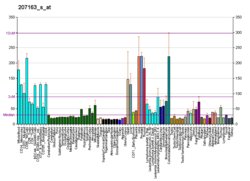History
AKT (now also called AKT1) was originally identified as the oncogene in the transforming retrovirus, AKT8. [8] AKT8 was isolated from a spontaneous thymoma cell line derived from AKR mice by cocultivation with an indicator mink cell line. The transforming cellular sequences, v-akt, were cloned from a transformed mink cell clone and these sequences were used to identify Akt1 and Akt2 in a human clone library. AKT8 was isolated by Stephen Staal in the laboratory of Wallace P. Rowe; he subsequently cloned v-akt and human AKT1 and AKT2 while on staff at the Johns Hopkins Oncology Center. [9]
In 2011, a mutation in AKT1 was strongly associated with Proteus syndrome, the disease that probably affected the Elephant Man. [10]
The name Akt stands for Ak strain transforming. The origins of the Akt name date back to 1928, when J. Furth performed experimental studies on mice that developed spontaneous thymic lymphomas. Mice from three different stocks were studied, and the stocks were designated A, R, and S. Stock A was noted to yield many cancers, and inbred families were subsequently designated by a second small letter (Aa, Ab, Ac, etc.), and thus came the Ak strain of mice. Further inbreeding was undertaken with Ak mice at the Rockefeller Institute in 1936, leading to the designation of the AKR mouse strain. In 1977, a transforming retrovirus was isolated from the AKR mouse. This virus was named Akt-8, the "t" representing its transforming capabilities.
This page is based on this
Wikipedia article Text is available under the
CC BY-SA 4.0 license; additional terms may apply.
Images, videos and audio are available under their respective licenses.









